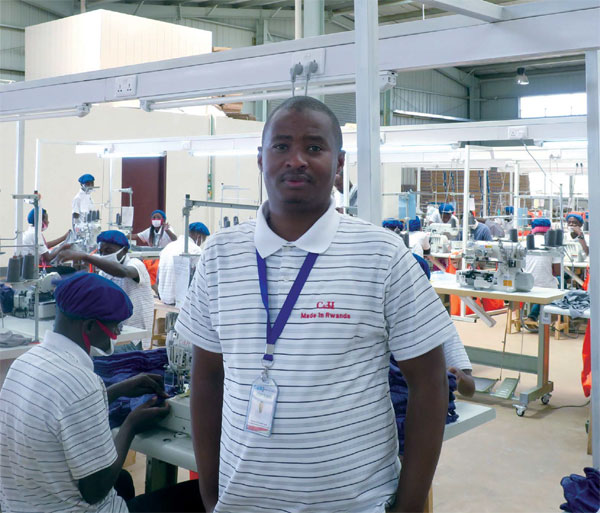Single market to boost African-made brands
China Daily Africa, August 8, 2016 Adjust font size:

Saidi Hitimana, assistant general manager of C&H Garments Ltd, says Africa is a Chinese major investment destination. Lucie Morangi / China Daily
Chinese garment firm in Rwanda backs AU passport, negations on continental free trade zone.
A Chinese garment manufacturer with factories in Rwanda, Kenya and Ethiopia has welcomed talk of an African single market, saying it will unlock the continent's vast growth potential.
The African Union launched a passport last month that allows citizens visa-free movement between member states.
The announcement came during a summit in the Rwandan capital, Kigali, where also on the agenda was the Continental Free Trade Zone, which will create a single market for goods and services. Although still in negotiation, talk of the zone has buoyed the expectations of businesses, especially those looking to expand in Africa.
C&H Garments Ltd is one such example. The Chinese company has a factory just 15 minutes from the Kigali Convention Center, which hosted the AU summit.
The plant, opened in March last year, recently recruited 400 workers, taking its total up to 500, to handle an increase in orders from Europe and North America, according to its assistant general manager, Saidi Hitimana.
"We expect to have a workforce of 1,500 by the end of the year," he says, adding that the number could even be higher if the garment factory gains free access to the continental market. Currently, 80 percent of its products are shipped outside Africa due to low consumption in Rwanda.
Rwanda has about 12 million people. Official data show 57 percent live below the poverty line, with 37 percent living in "extreme poverty".
The landlocked nation is a member of the East Africa Community, along with Burundi, Kenya, South Sudan, Tanzania and Uganda. Together, they have a population of over 140 million.
However, Hitimana says C&H still has to contend with tariffs and nontariff barriers as well as high transportation costs and regular delays.
Shipping costs in Africa are among the highest in the world, 50 percent more on average than in European Union countries and the United States, according to Trademark East Africa, a nonprofit group. In eastern areas, these costs can be as much as 75 percent of exports' value.
Plus, there are 36 roadblocks on the route from Mombasa in Kenya to Kigali, and 30 between Rusumo in eastern Rwanda and Dar es Salaam, the capital of Tanzania.
"This doesn't only erode our margins, but also caps what we can produce in Rwanda," Hitimana says, explaining that his factory mainly produces uniforms because purchasers of such items allow extended delivery times. "Other garments have shorter timelines of less than three months, and we're unable to meet this because time is eaten up on the road."
Imported Chinese textiles arriving at Mombasa Port take two months to arrive in Kigali. Production takes two months, and then shipping for export takes two more.
Hitimana says the company has explored the option of buying textiles from Kenya, but the costs are relatively high. "One kilogram from Kenya costs $6.50, while we can buy the same fabric for $3.20 from China. The price difference hits our bottom line," he says, although the plant occasionally does pay the extra to meet orders from South Africa.
He adds that C&H believes bringing down the borders would solve such challenges as underdeveloped infrastructure, a lack of local suppliers and high energy costs.
According to the United Nations Conference on Trade And Development, full liberalization would have raised the share of intra-African trade as part of the continent's total trade from 10.2 percent to 15.5 percent between 2010 and 2020.
The East African region last year imported $151 million worth of secondhand clothing from Europe and North America, which poses a major challenge for Africa-made brands. Heads of the East Africa Community in February agreed to ban such imports, effective in three years, to breathe life into local manufacturing.
In addition to its base in Rwanda, C&H also has a factory on the outskirts of Addis Ababa, the Ethiopian capital, with 200 workers, and 5,000 workers in Kenya under the company name Future Garments. Hitimana says the AU passport, which allows people free movement to explore job opportunities in other countries, will rapidly shore up the skill shortage.
C&H employs 20 technicians from Kenya. Not only have they trained 40 Rwandans, who are now ready to take over, but they have also helped the plant to meet the quality standards set by international customers, the senior manager says.
Three months after opening last year, the Rwandan factory received an initial order worth $1 million to make reflective jackets for a customer in the United Kingdom. The company also received orders from the US in January and is now in discussions with French agents.
China's rising salaries and aging population, and increasing interest among Chinese investors in support Africa's industrialization, means the future looks bright for the continent, Hitimana says. He disputes claims that the wages paid by Chinese factories are unsustainably low, saying incentives such as bonuses bump up basic wages.
"We encourage productivity, and Rwandans are known to be more hardworking than their neighbors," he says, adding that if government support continues, C&H hopes to move to a factory that can house up to 5,000 workers.
Last year, Kigali introduced a preferential corporate income tax of 15 percent, down from 30 percent, for investors in priority sectors such as transport, energy, financial services, affordable housing and logistics. Those who put in more than $50 million in strategic areas such as energy, tourism, manufacturing, information technology or healthcare can also enjoy a tax holiday of up to seven years.
Rwanda has received more than $170 million in Chinese investment in the past five years, according to official data.